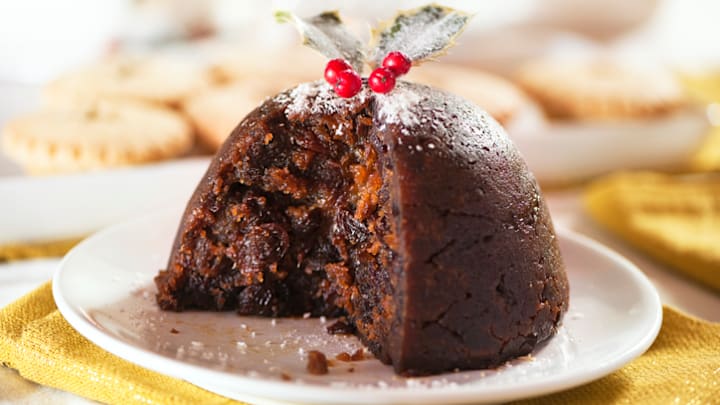“We Wish You a Merry Christmas” is an ode to figgy pudding disguised as a straightforward Christmas song. Three out of four verses in some versions are dedicated to the dish. So after listening to enough holiday music this December, you may start to wonder: What is figgy pudding, anyway? And is it really so good that you’d actually beg for it on a stranger’s doorstep through song?
According to NPR, figgy pudding, also called “plum pudding,” isn’t pudding—at least not the kind of pudding many Americans think of when they hear the word—and it contains neither figs nor plums. In the UK, pudding is used as catch-all to describe any sweet dish served after a meal. Figgy pudding isn’t creamy or custardy, but it is a sugary cake, which qualifies it as pudding overseas.
In its most basic form, figgy pudding is a steamed, often domed-shaped cake made with alcohol and dried fruit. The first version of figgy pudding surfaced in Britain in the 14th century. Back then, it was a stew-like, savory dish containing beef and mutton as well as fruit and wine. In the 15th century, this mixture was stuffed into animal casings to make sausages that would last through the winter.
By the end of the 16th century, figgy pudding had transitioned to a fully sweet dish—right around the same time carolers started singing, “Now bring us some figgy pudding,” to their wealthy neighbors around Christmas. Today, the dessert is commonly filled with currants, raisins, and soaked in rum or brandy.
So where did the first half of its name come from? In pre-Victorian England, the word plum was applied to any type of dried fruit, including raisins, so plum pudding caught on. Figs occasionally appeared in recipes throughout the dish's history, though they’re not considered a traditional ingredient.
If you’re thinking about cooking a throwback feast this Christmas, don’t stop at figgy pudding. From oyster stew to mincemeat pie, here are some more classic British dishes that have ties to the holiday.
Have you got a Big Question you'd like us to answer? If so, let us know by emailing us at bigquestions@mentalfloss.com.
Read More Fascinating Stories About Christmas Food:
A version of this story ran in 2019; it has been updated for 2024.
